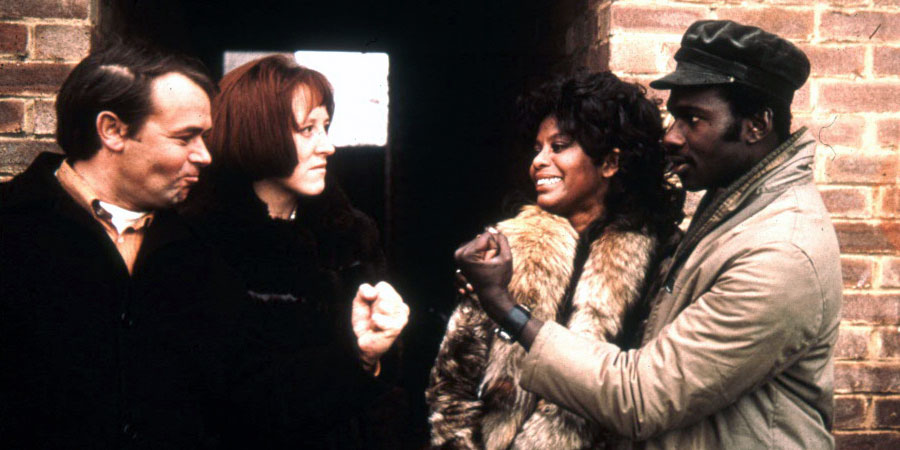As with "Till Death Us Do Part" and even "Don't Drink The Water", "Love Thy Neighbour" reflects two sides to standard approaches towards a lack of familiarity. Some characters - in this case the women - strive for a sense of commonality and universality and the others - here the men - principally perceive distinctions. Key to those "distinctions" was a belief in race and colour (and much the same was true in the 1970s of sexual orientation) as being a CHARACTERISTIC, with then assumed associated behaviours. Interestingly in neither stance/outlook is there much evidence of concepts of IDENTITY which became the principal emphasis later and largely sits between the two. Ultimately of the three, it is the women's (and in the case of "Till Death Us Do Part" the young people's) stance which is the genuine one and the purest in human terms.
Nevertheless it is a process. Emphasis on identity may well be a step forward from characterisation but it is also the other side of the coin from characterisation. That is, in terms of an almost territorial holding back from accepting common or universal purpose. This is to say that the advancing of the belief that the average white person benefited from Empire and was privileged is as fake (a century of real poverty without a benefits system, two World Wars, ongoing class inequality) as any belief that being black is so fundamental to identity that it equals being anything especially distinctive. In the main, the fake quality of each stance is not overtly malevolent in intention. Much of it derives from misunderstanding even when it comes with barbs, as in certain sitcoms which have acquired the status of notoriety. Or indeed even without that angle.
As a white man of a certain age, the likes of Lenny Henry (with whom I once played a bit of pool) and Meera Syal have helped me in recent years to learn where I personally got it wrong. I actually went out of my way to embrace racial changes in the 1970s and the 1980s but I did so because it came naturally via local personal interactions, it seemed to me to be morally right and racial difference when the numbers of people of ethnicity in my vicinity were minute was interesting to me like a spice is to life. What I didn't see clearly was any ethnic perspective on British culture. Now it seems blatantly obvious. I can see how stereotypical portrayal can be simplified and made insidious as no doubt it was.
Still. today's right always becomes tomorrow's wrong. It is worth bearing this in mind when we hear supposedly authoritative lines on anything from anyone in this, the third decade of the present century. Intelligent folk seek to anticipate what of the here and now will later be questioned or attacked. It is not that today's emphasis on the pursuance of additional rights by supposed categories of identity is inapt. But by necessity one notes that it inevitably comes with distortions and lacunas (eg ignoring that it is white working class males who do the least well at school, claiming that EU membership is the epitome of racial diversity when the membership of its Parliament is over 97% white : higher once the UK leaves it, or the embracing of virtual slave labour from Eastern Europe as something that is pretended to be benign).
Hence to a considerable extent it is in essence a generational overhang. While often noted most at the youthful end of culture it is ostensibly supported vocally and financially by the current middle aged. The ones who of all past generations have shown the least ability to think beyond what it was they experienced or accept that they are now the Establishment to be overturned. Such is inevitably the way at the higher echelons of the upwardly mobile. Unprecedented wealth, influence, celebrity, absence of wartime experience in younger age and luxury are all blinds on seeing clearly into self so at best they will be an uncertain spotlight in the round. There are exceptions. For an extremely classy, erudite and nuanced black perspective, I would very much welcome BCG interviewing Trix Worrell. I rate him extremely highly and consider him to have been more groundbreaking than is acknowledged, with and without the fiery help of the great Norman Beaton.

